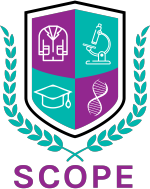
After completing 12th science, many students face the challenging decision of choosing the right career path. While traditional medicine remains a popular choice, the healthcare sector also offers a range of alternative career opportunities through paramedical courses. These courses allow students to enter the workforce quickly and start building a meaningful career in the healthcare industry.
Paramedical careers are ideal for students who want to contribute to the medical field but prefer a more technical or support-oriented role. These courses provide job-oriented training and equip graduates with specialized skills that are in high demand. In this blog, we’ll explore some of the top paramedical career options available after 12th science, focusing on the courses offered by SCOPE College, a leading provider of paramedical education.
Top Paramedical Career Paths After 12th Science
1. Bachelor of Vocation in Medical Lab Technology
The Bachelor of Vocation in Medical Lab Technology is a specialized undergraduate course that integrates both theoretical knowledge and practical skills in the field of medical laboratory technology. This course is perfect for students who want to work in clinical laboratories and diagnostic centers.
The program emphasizes hands-on training in various medical laboratory procedures, such as blood tests, urine analysis, and microbiological testing. By combining academic study with practical skills, graduates of this program are well-equipped to enter the workforce immediately after graduation.
Graduates of the Bachelor of Vocation in Medical Lab Technology can work in hospitals, diagnostic centers, research labs, and even pathology labs. With SCOPE College’s extensive lab facilities and focus on practical training, students receive the best preparation for their careers.
Learn more about the Bachelor of Vocation in Medical Lab Technology here.
2. Diploma Course in Medical Lab Technology
For students looking to gain quick entry into the healthcare sector, the Diploma Course in Medical Lab Technology is an excellent option. This one-year course covers the fundamentals of laboratory technology, including the analysis of blood, urine, and other biological samples. Students also learn how to operate lab equipment and interpret diagnostic data.
This diploma program is ideal for those who want to start working in medical labs immediately after completing the course. The training provided in this program focuses on practical skills, ensuring that students are job-ready upon graduation. Graduates can work as medical lab technicians, sample analysts, or laboratory assistants.
Find out more about the Diploma Course in Medical Lab Technology here.
3. BSc in Medical Laboratory Technology
For students seeking a more comprehensive education in medical laboratory technology, the BSc in Medical Laboratory Technology is an excellent choice. This degree program covers a wide range of topics, including clinical chemistry, microbiology, pathology, and hematology.
The program prepares students for advanced roles in medical labs, where they will perform a variety of diagnostic tests. This course provides a deep understanding of laboratory techniques and prepares graduates for more specialized roles in medical diagnostics, research, or laboratory management.
Graduates of the BSc in Medical Laboratory Technology can work as lab technicians, medical researchers, and clinical supervisors in hospitals, diagnostic labs, and research institutions.
Learn more about the BSc in Medical Laboratory Technology here.
5. Certificate Course in Radiology Technician
The Certificate Course in Radiology Technician focuses on training students to perform radiographic procedures, such as X-rays, CT scans, and other imaging techniques. Radiology technicians are critical members of the medical team, helping diagnose a wide range of health conditions through medical imaging.
In this course, students learn how to operate radiographic equipment, handle patients, and maintain safety protocols during imaging procedures. With healthcare facilities increasingly relying on diagnostic imaging, the need for skilled radiology technicians is growing.
Graduates of this course can find employment in hospitals, radiology clinics, diagnostic centers, and imaging facilities.
Find out more about the Certificate Course in Radiology Technician here.
6. Diploma Course in Cardiology Technician
The Diploma Course in Cardiology Technician is designed for students who want to specialize in cardiovascular diagnostics and treatment. In this two-year program, students learn how to operate cardiology equipment, conduct tests such as ECG and stress tests, and assist cardiologists in diagnosing and treating heart conditions.
Cardiology technicians are in high demand due to the growing prevalence of cardiovascular diseases. This course provides students with the skills and knowledge needed to perform diagnostic tests and work in heart care centers, hospitals, and diagnostic labs.
Graduates of the Diploma in Cardiology Technician can expect to find employment in heart care centers, diagnostic clinics, and hospitals, where they will work alongside cardiologists and other healthcare professionals.
Learn more about the Diploma Course in Cardiology Technician here.
Why Choose a Career in Paramedical Fields After 12th Science?
High Demand for Skilled Professionals
The healthcare industry is constantly evolving, with a growing need for skilled paramedical professionals. As medical technology advances, the demand for specialized technicians and support staff increases.
Job-Oriented Education
Paramedical courses are designed to provide practical, hands-on training that ensures graduates are ready to enter the workforce immediately after completing their courses.
Flexible Work Environment
Paramedical professionals can work in various healthcare settings, including hospitals, diagnostic centers, clinics, and research facilities. This flexibility allows graduates to choose from a wide range of career options.
Career Stability and Growth
The healthcare industry offers long-term job security and ample growth opportunities. Skilled paramedical professionals can expect a stable career with opportunities for advancement.
Why Choose SCOPE College for Your Paramedical Education?
SCOPE College offers a wide range of paramedical courses that provide students with the skills and knowledge needed to succeed in the healthcare industry. Here are some of the reasons it stands out:
World-Class Lab Facilities
Students have access to advanced lab equipment, ensuring they receive hands-on training with the latest technology in the healthcare field.
100% Job Placement Assistance
Strong placement support ensures that students find suitable employment after completing their courses.
Internship Opportunities
Students have the opportunity to intern at hospitals, nursing homes, diagnostic centers, or clinics, gaining valuable experience in real-world healthcare settings
Global and Local Placement Opportunities
Extensive placement support across the globe and locally, ensuring access to diverse career opportunities.
Blended Learning
Flexibility of online and offline learning options, making it convenient for those who wish to balance work and study.
Alumni Support & Career Guidance
Continuous support from the alumni network to help guide students in their career paths.
Contact us for more details on paramedical courses and career options.
Conclusion
Choosing the right career path after 12th science is a crucial decision. Paramedical courses provide an excellent opportunity for students who are passionate about the healthcare field but prefer technical and support roles. With options like the Bachelor of Vocation in Medical Lab Technology, Diploma in Cardiology Technician, and many more, SCOPE College offers specialized training that prepares students for success.
Ready to kickstart your paramedical career? Visit SCOPE College today to learn more about our courses and start your application process!
Frequently Asked Questions
Which is the best career after 12th science?
A: The best career after 12th science depends on your interests, but if you’re looking for a promising career in healthcare, paramedical courses are an excellent option. Courses like the Bachelor of Vocation in Medical Lab Technology, Diploma in Cardiology Technician, and Bsc Mlt offer specialized skills, hands-on training, and high job demand, making them ideal for science students passionate about healthcare.
Which course after 12th has the highest salary?
A: Among paramedical courses, roles like a Cardiology Technician offer lucrative salary potential. Graduates in these fields can expect competitive starting salaries, with opportunities to grow further. As the healthcare industry continues to expand, these professionals remain in high demand, which can lead to significant salary growth over time.
Which degree is best for science students?
A: For science students, the BSc in Medical Laboratory Technology is an excellent degree option. This comprehensive program covers extensive areas of medical testing and diagnostics, preparing students for advanced roles in medical labs, hospitals, and research facilities. The hands-on experience and in-depth knowledge provided by this degree ensure a promising career in the medical field.
Which job is best for girls after 12th science?
A: There are various great career options for girls after 12th science, especially in paramedical fields. Medical Lab Technicians and Cardiology Technicians are all excellent career options that offer job stability, good salaries, and meaningful work in the healthcare industry. These roles allow girls to contribute to healthcare while enjoying a balanced and rewarding career path.
